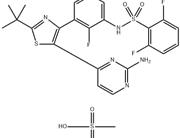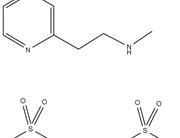1/2
Imatinib mesylate NEW
- Min. Order1kg
- Purity99%
- Cas No220127-57-1
- Supply Abilityg-kg-tons, free sample is available
- Update time2025-09-25
| Product Name | Imatinib mesylate |
| CAS No | 220127-57-1 |
| EC-No | |
| Min. Order | 1kg |
| Purity | 99% |
| Supply Ability | g-kg-tons, free sample is available |
| Release date | 2025/09/25 |
1. Materials information
Names
| Name | imatinib methanesulfonate |
|---|---|
| Synonym | More Synonyms |
Imatinib Mesylate (STI571) Biological Activity
| Description | Imatinib Mesylate is a tyrosine kinases inhibitor that inhibits c-Kit, Bcr-Abl, and PDGFR (IC50=100 nM) tyrosine kinases. |
|---|---|
| Related Catalog | Signaling Pathways >> Autophagy >> Autophagy Signaling Pathways >> Protein Tyrosine Kinase/RTK >> Bcr-Abl Signaling Pathways >> Protein Tyrosine Kinase/RTK >> c-Kit Signaling Pathways >> Protein Tyrosine Kinase/RTK >> PDGFR Research Areas >> Cancer |
| Target | IC50: ~100 nM (c-Kit, Bcr-Abl, and PDGFR)[1] |
| In Vitro | Imatinib (STI571) Mesylate inhibits c-Kit autophosphorylation, activation of MAPK, and activation of Akt without altering total protein levels of c-kit, MAPK, or Akt. The concentration that produces 50% inhibition for these effects is approximately 100 nM[1]. Imatinib (STI571) mesylate is very effective (in vitro IC50 of 25 nM) against the chronic myeloid leukemia-causing kinase Bcr-Abl. Imatinib also efficiently inhibits Kit (in vitro IC50, 410 nM) and PDGFR (in vitro IC50, 380 nM)[2]. Imatinib (STI571) mesylate is a multi-target inhibitor of v-Abl, c-Kit and inhibits Bcr/Abl, v-Abl, Tel/Abl, the native PDGFβ receptor, and c-Kit, but it does not inhibit Src family kinases, c-Fms, Flt3, the EGFR or multiple other tyrosine kinases. Imatinib inhibits tyrosine phosphorylation and cell growth of Ba/F3 cells expressing Bcr/Abl, Tel/Abl, Tel/PDGFβR, and Tel/Arg with an IC50 of approximately 0.5 μM in each case, but it has no effect on untransformed Ba/F3 cells growing in IL-3 or on Ba/F3 cells transformed by Tel/JAK2[3]. Imatinib mesylate selectively inhibits the activity of Bcr/Abl, c-Kit and PDGFR kinases. Imatinib mesylate reveals distinct and rapid antileukemic activity in chronic myelogenous leukemia (CML) and Philadelphia-positive (Ph+) acute lymphoblastic leukemia (ALL)[4]. |
| In Vivo | Animals treated with Imatinib Mesylate show a decrease of mean body weight throughout the whole study. Body weight loss is noticeable in mice from groups that receive chemotherapy and the vitamin D analog combined treatment. The body weight decrease of mice treat with both combined Imatinib mesylate and PRI-2191 is the highest (15%) on Day 22 of the experiment, but after that day, mice start to recover[4]. In a rat Ischemia/reperfusion injury (IRI) model, Imatinib mesylate attenuates lung injury by an antipermeability and antiinflammatory effect. The delivery and function of Imatinib mesylate in the lung is also confirmed in this model[5]. |
| Cell Assay | Tested A549 cells are placed in 96-well flat-bottom plates at a density of 5×103 cells per well 24 h before the addition of the test compounds. The cells are incubated for 96 h with two different concentrations (10 and 100 nM) of PRI-2191 and concurrently with various concentrations of Imatinib mesylate (10, 100, 1000 and 10,000 ng/mL) and other cytostatic drugs (Docetaxel (DTX) or Idarubicin (ID) : 0.1, 1, 10, 100 ng/mL; Cisplatin (CIS): 1, 10, 100, 1000 ng/mL). The sulforhodamine B (SRB) assay is performed to evaluate the cytotoxic effect. As a result, IC50 is calculated for each separate experiment in Cheburator 0.4, Dmitry Nevozhay software[4]. |
| Animal Admin | Mice[4] NOD/SCID female mice, 12-16 weeks old, body weight of 20-25 g, are used. Mice are subcutaneously (s.c.) inoculated in the right flank of the abdomen with A549 tumor cells suspension (5×106 cells in 0.2 mL of Hank’s medium per mouse, Day 0) and then are randomized into groups receiving varied combinations of vitamin D analogs and chemotherapeutics. One out of two experimental protocols is applied in the respective experiments: 1. The treatment is started from Day 7 after inoculation of tumor cells (when tumors become palpable). Imatinib mesylate is administered intraperitoneally (i.p.) at a dose of 75 mg/kg/day, daily for 19 days (from Days 7-25). PRI-2191 is administered s.c. or by oral gavage at a dose of 2 μg/kg/day, 3 times a week (on Days 7, 12, 14, 16, 19, 21 and 23). 2. The treatment is started from Day 7 after inoculation of tumor cells (when tumors become palpable). Imatinib mesylate is administered intraperitoneally (i.p.) at a dose of 50 mg/kg/day, daily for 13 days (from Days 7-19). PRI-2191 and PRI-2205 are administered s.c. at doses of 1 or 10 μg/kg/day, respectively, 3 times a week (on Days 7, 10, 12, 14, 17, 19, 21, 24 and 26). At the end of the experiments, blood is collected under anesthesia; then, the mice are sacrificed. Rats[5] Male Lewis rats weighing 270 to 320 g are used in the experiments. Imatinib mesylate (50 mg/kg) is injected intraperitoneally in the Imatinib group (n=7), and 0.5 mL of 20% DMSO without Imatinib is administered in the vehicle group (n=7). The dose of 25 mg/kg is preliminarily tested, and it produces a little improvement in lung function without statistical significance. The dose of 50 mg/kg and intraperitoneal administration are adopted based on this result and past reports. The animals undergo left thoracotomy, and the left hilum is occluded with a small metallic clamp. The occlusion is performed 20 minutes after Imatinib or vehicle administration. During clamping, the tidal volume (TV) and respiratory rate (RR) are adjusted to 8 mL/kg and 80 breaths/min, respectively. After 90 minutes of ischemia, the clamp is removed and reperfusion is maintained for 120 minutes. During reperfusion, blood flow and ventilation are restored in the bilateral lung. In the sham group (n=6), the animals are heparinized, thoracotomized, and ventilated for 210 minutes. |
| References | [1]. Heinrich MC, et al. Inhibition of c-kit receptor tyrosine kinase activity by STI 571, a selective tyrosine kinase inhibitor. Blood. 2000 Aug 1;96(3):925-32. [2]. Guida T, et al. Sorafenib inhibits imatinib-resistant KIT and platelet-derived growth factor receptor beta gatekeeper mutants. Clin Cancer Res. 2007 Jun 1;13(11):3363-9. [3]. Okuda K, et al. ARG tyrosine kinase activity is inhibited by STI571.Blood. 2001 Apr 15;97(8):2440-8 [4]. Maj E, et al. Vitamin D Analogs Potentiate the Antitumor Effect of Imatinib Mesylate in a Human A549 Lung Tumor Model. Int J Mol Sci. 2015 Nov 13;16(11):27191-207. [5]. Tanaka S, et al. Protective Effects of Imatinib on Ischemia/Reperfusion Injury in Rat Lung. Ann Thorac Surg. 2016 Jul 23. pii: S0003-4975(16)30523-9 [6]. Meirson T, et al. Targeting invadopodia-mediated breast cancer metastasis by using ABL kinase inhibitors. Oncotarget. 2018 Apr 24;9(31):22158-22183. |
Chemical & Physical Properties
| Density | 0.858 g/mL at 25 °C(lit.) |
|---|---|
| Boiling Point | 133-134 °C(lit.) |
| Melting Point | 214-224°C |
| Molecular Formula | C30H35N7O4S |
| Molecular Weight | 589.708 |
| Flash Point | 64°F |
| Exact Mass | 589.247131 |
| PSA | 149.03000 |
| LogP | 5.19690 |
| Index of Refraction | n20/D 1.401(lit.) |
| Storage condition | -20°C Freezer |
MSDS
Imatinib Mesylate (STI571) MSDS(Chinese) |
Safety Information
| Symbol |  GHS07 |
|---|---|
| Signal Word | Warning |
| Hazard Statements | H302 |
| Precautionary Statements | P301 + P312 + P330 |
| Hazard Codes | Xn |
| Risk Phrases | 22 |
| Safety Phrases | S16-S26-S36/37/39 |
| RIDADR | UN 1993 3/PG 2 |
| WGK Germany | 3 |
| Packaging Group | II |
| Hazard Class | 3 |
| HS Code | 2933990090 |
Customs
| HS Code | 2933990090 |
|---|---|
| Summary | 2933990090. heterocyclic compounds with nitrogen hetero-atom(s) only. VAT:17.0%. Tax rebate rate:13.0%. . MFN tariff:6.5%. General tariff:20.0% |
2. Packaging of materials
For powders: normal is 25kgs/Drum or bag, or larger/smaller package as request.
For liquids: normal 25kgs/drum, 180-300kgs/bucket, or IBC, determined by the nature of the product.
Or smaller package 1kg/bottle, 10kgs/bottle as request.
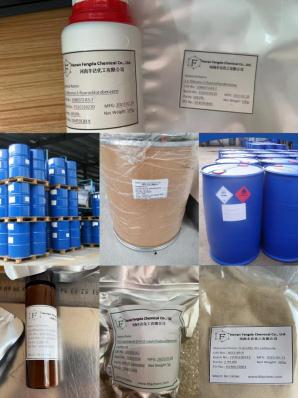
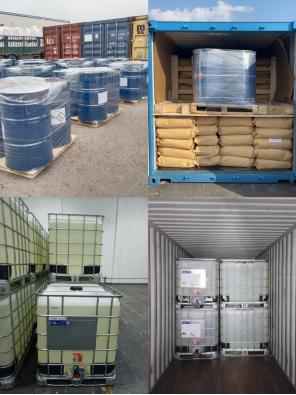
3. Shipping & Delivery
By Express
Provide door to door service
Suitable for goods under 50kg
Delivery: 3-7 days
Cost: low cost

By Air
Provide airport to airport service
Suitable for goods over 50kg
Delivery: 3-14 days
Cost: high cost

By Sea
Provide seaport to seaport service
Suitable for goods over 100kg
Delivery: 2-45 days
Cost: low cost

4. Contact information
For more details, pls contact us freely.
Email address: mia@fdachem.com
Mob: 86 18336764634
WhatsApp/Skype/Wechat/LINE: 86 18336764634
Company Profile Introduction
Henan Fengda Chemical Co., Ltd. is located in the High-tech Development Zone of Henan Province. Specializing in the production and sales of various fine chemical products required for industrial production, including chemical raw materials, organic raw materials, petrochemicals, chemical reagents, solvents, catalysts, and additives, etc.
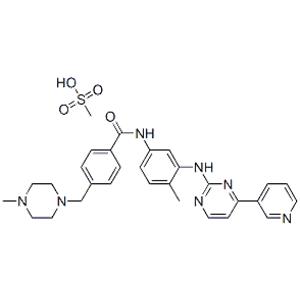


 China
China